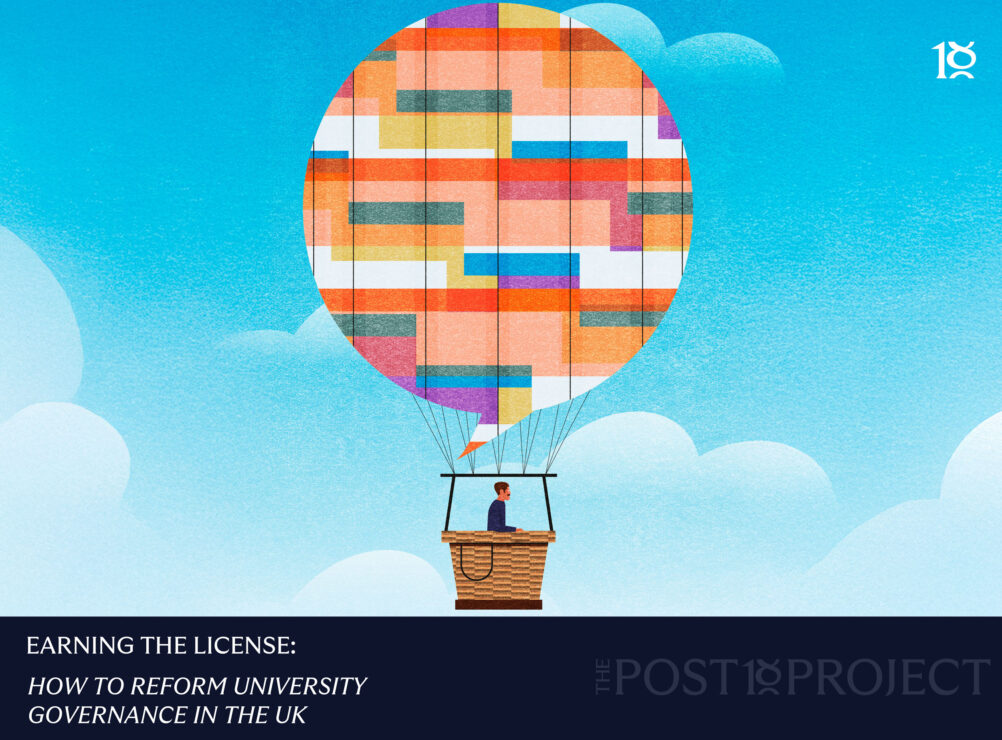Though mental health and wellbeing were priority issues for universities before the Covid-19 pandemic, they’ll be flashing red on every risk register this autumn.
Years of work from universities and students’ unions have broken down the stigma attached to talking about poor mental health, and boosted the availability of expert support for students who are struggling – even though the need for support continues to outstrip supply.
The Student Minds university mental health charter and the updated Universities UK Stepchange framework both advocate a “whole university” approach to fostering wellbeing.
The universities we work with are finding that this means more than improving the services on offer for students in crisis. At the University of Exeter, funding for wellbeing services has doubled over the past three years, but the demand for those services has also increased in parallel – and so services continue to be stretched.
A new approach is needed. “We’re thinking how we might move the system from one where we’re constantly waiting for people to become ill and trying to address their needs, to one in which we’re trying to promote a continuous state of wellness,” says Tim Quine, deputy vice chancellor for education at the University of Exeter.
Students in crisis and those with mental health conditions will always need expert support, and close working partnerships between universities and local NHS trusts. But a student in crisis is often the very definition of hard to reach, and much damage may be done to academic engagement and long term wellbeing before that student is able to access the help they need.
Plenty of universities have invested in activity and programmes designed to support good mental health. But some now believe that mental fitness – the ability to absorb and recover from stressful episodes, manage difficult emotions, and improve confidence and personal motivation – should be a recognised part of a university curriculum.
A nationwide study we conducted last year at Fika reflected this shift in thinking – we saw high demand from students to see emotional education added to the curriculum, with graduate employers agreeing that this addition would improve students’ chances of career success.
Fit for the future
The Fika mental fitness curriculum framework, courses in seven skills and assignment platform are underpinned by the daily exercise format we introduced to help students build mental fitness. These daily exercises were imagined as part of a suite of activities and resources universities could recommend to help students and they were groundbreaking in their focus on building mental fitness among otherwise “well” individuals rather than waiting until the point of crisis.
The results were extremely positive among first year students who used Fika in comparison with a control group who engaged in a different wellbeing intervention. But it was also clear from the outset in working with our partners that to make the kind of radical difference we hoped to make, there would need to be greater attention in curriculum and pedagogy to the role of mental fitness in supporting academic achievement and wellbeing.
Part of this is the pragmatic assessment that if something is to be perceived as important, it has to be in the curriculum, as that’s the most essential, core part of university activity.
And there’s a wider driver here, too: that well-rounded graduates should be emotionally and mentally equipped to navigate their lives and careers, as well as academically equipped. As our collective understanding grows of the social and personal cost of poor mental health, and the ways that environments and individual practices can improve mental fitness, the education system becomes a necessary and influential vehicle for the dissemination and practice of those insights.
It’s not only students who can benefit from this approach. While historic academic values – rigour, freedom of thought, collegiality, the necessity of critique – are excellent in themselves, if untempered with values such as compassion and inclusion, they can crowd out weakness or vulnerability. And contemporary pressures on the university add the risk of atomisation, and a focus on individual performance rather than the development of thriving academic communities.
“With the marketisation of education, we’ve lost the sense of education as something that is character forming, and that happens in a community,” says Louise Lawrence, associate professor in theology and religion at Exeter. As project lead for Exeter’s wellbeing in the curriculum project, part of a wider Advance HE programme, Louise analysed a range of data sources, and found the theme of kindness recurring in qualitative data: “I kept seeing comments like ‘when people were kind to me I felt included’ – I don’t think that can be underestimated too much. So we’ve decided to champion compassion, not as an emotion, but as part of the neuropsychology of how we live together. Being kind can be lost in neoliberal capitalist contexts.”
Curriculum infusion
For any cross-cutting concept to be embedded in an academic curriculum, it has to make sense within the modes of thinking, knowing, and communicating in that academic subject.
“Each generation has a different approach and way of thinking about their mental health,” says Jennifer Cumming, professor of sport and exercise psychology at the University of Birmingham. “We’re seeing a rise in young people presenting mental health issues, and cultural shifts in how we talk about mental health that require universities to take a more holistic approach.”
Jennifer argues that positive psychological practices such as mobilising a strengths-based approach, where the focus is not on problems but on potential, apply universally and equally in different sorts of populations, from the at risk and homeless young people she works with alongside local youth homeless charity St Basils, to elite athletes.
At Birmingham a new BSc programme will incorporate a module on sport and mental health, whose aims include embedding understanding of mental health and self-care among students, though Jennifer acknowledges “it may be easier to embed in disciplines where there is already this sort of knowledge.” In other subjects, where the language and lenses of mental wellbeing are less a part of disciplinary practice, academics may feel that the topic sits uneasily alongside the current curriculum.
One possible approach to avoid a sense of curriculum contortion is to examine the existing pedagogies of the subject and identify where students are already engaged in practices that build mental fitness. In art and design, it’s common to engage in group critique. In business subjects, students frequently work in teams on projects and pitches. And the humanities, with their emphasis on independent study, require a great deal of self-discipline.
At Exeter, Louise plans to work with directors of education across the academic disciplines to think through disciplinary issues and potential pressure points such as transition, oral presentations, or assessments.
A reference point for Exeter is Theo Gilbert’s work on compassion in the curriculum, especially in small group work. Gilbert’s website has a slide deck for tutors to use to prompt students’ reflection on their own behaviour in groups and to notice and act on signs of discomfort in themselves and other group members.
Louise also cites the practice of “curriculum infusion” as part of the Engelhard Project for Connecting Life and Learning at Georgetown University, in which health and wellbeing issues that students may be grappling with feature in curricula in appropriate disciplines – one example is the application of mathematical modelling to making decisions about alcohol intake.
Structured interactions
An alternative approach is to mobilise personal academic tutoring to create space for conversations that support the development of mental fitness. At Middlesex University, Emily McIntosh is leading a pilot project to do exactly that.
“If universities treat advising as teaching it gives us the opportunity to place mental health, wellbeing, and self-care at the heart of curriculum,” she says. “If we try to bombard students with too many of these important messages on arrival we risk overloading and overwhelming them. But if we scaffold their experience, align advising with other learning and teaching activities and map that across a 16 week transition programme not only is it less overwhelming, we’re more likely to hear what those concerns are and we’re more likely to be responsive.”
Simply expecting students to seek help when they are struggling isn’t useful for those who are not accustomed to speaking up. “Feedback is for the privileged – it requires people to understand that they have a voice, to understand that their voice matters and for students to know that we want to hear their perspective,” says Emily.
Emily believes that too often students and tutors are not adequately supported to have the kind of conversations that lead to insight about students’ mental wellbeing. “Students struggle to understand the importance of their own voice and may perhaps struggle to articulate their perspective” she says. “And tutors need to gain confidence in how to navigate difficult conversations so that they can involve specialist colleagues in the provision of student support – a key part of this is discussing how mental health and wellbeing affect academic performance. We can acknowledge students’ anxieties and normalise help-seeking behaviours.”
There’s a school of thought that says the university has become too “therapeutic”, with students overly protected from ideas and experiences that may trouble them. While it’s highly debatable that this is, in fact, the case, Tim acknowledges the risk that unsympathetic observers could characterise Exeter’s embrace of the compassionate campus as reducing the extent to which students are challenged in their academic study, with an associated loss of opportunity to improve their resilience.
“We’re absolutely committed to removing awarding gaps [between different groups of students],” he says, “but we’re trying to help students’ learning, to understand what is the best way to help people succeed in terms of developing knowledge and attributes. Assessment will have to be just as rigorous, and we won’t be lowering any hurdles – we might just start with lower hurdles and work up to bigger hurdles.”
Emily is clear that the aim is to build students’ capacity and confidence to take on challenges and to handle uncertainty: “We could spend time trying to deal with problems on students’’ behalf rather than supporting them to solve their own challenges, alongside our support. There’s a way of helping students to build confidence without total overwhelm and this is a key part of the learning process.”
Though this year continues to test the limits of the resilience of staff and students across the sector, it’s been exciting to see this new thinking emerge and be part of this process of curriculum enhancement. In the year ahead, we’ll be rolling out our own mental fitness curriculum framework, and working closely with our university partners to continue to develop our thinking and practice. If the pandemic has taught us anything, it’s that we should all be attentive to our baseline levels of mental fitness, and skilled in maintaining these, because you never know when they are going to be put under strain.
This article is published in association with Fika. You can find out more about how Fika’s mental fitness curriculum framework can help universities embed mental fitness here.














I work with headteachers who are incorporating mental and emotional resilience into their curriculum (for staff and students) and more recently, self compassion.
Here is a link to a website and animation on self compassion that is completely free to use and download.
https://whenthetensiongoes.com/